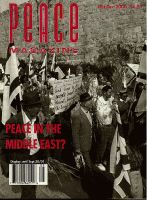
Peace Magazine Oct-Dec 2000, page 5. Some rights reserved.
Search for other articles by various here
Your interview with Professor Lipset was excellent. I found particularly interesting the suggestion that net capital exporting countries lose money. Folks should realize that competitive market forces affect returns to investment just as they drive down commodity prices or wages. I wouldn't be surprised if many large foreign investments made during the European colonial era had negative earnings for two reasons: 1) insufficient information due to large distances and the uncertainty surrounding many novel ventures, and 2) non-financial benefits. Entrepreneurs appear to often make "vanity investments" which result in over-investment and negative financial returns: witness professional sport teams, luxury destination resorts, theatre, fish processing plants and so on.
Most multi-nationals appear nowadays to be better supervised by shareholders and are certainly mandated to avoid losing money. Does this mean they "exploit" the host country? I am not entirely sure what "exploitation" means, but I would suggest that the technology transfers, particularly on-the-job learning, that results from direct foreign investment, in many cases more than compensate exported profits because of the autonomous economic development that can follow. In some instances, multinationals can play a key role in political change; witness the vital political space provided black trade unions inapartheid South Africa by Amercan car companies during the 1970s and 1980s .
So: If modern economic development and democracy seem to be inextricably intertwined-free market economists argue that the information demands of a modern sophisticated economy overwhelm an authoritarian regime's ability to effectively manage-then why doesn't the USA economically sabotage the Castro regime by drowning it in trade and investment? Why does the leading spokesperson or apologist for democratic capitalism seem to doubt its abilities to peacefully topple Cuba's authoritarian regime? The political strength of the vicious, vengeful Cuban ex-patriate population in Florida is one obvious but insufficient explanation.
Perhaps Professor Lipset has some enlightening thoughts on why the USA seems incapable of co-opting Cuba into the democratic family of nations?
Erik Poole
Burnaby, B.C.
epoole@sfu.ca
If the "science" of war can be taught and researched, it follows that the same can be applied to peace. Education is virtually the only foundation for peace. Historically, it has been students who have successfully deposed despots peacefully, and established equitable and fair governance.
Canada should establish a full University of Peace offering master's degrees and doctorates. Colleges and universities all over the world are offering Peace and Conflict Studies, but there is no graduate-level degree program in Canada. We need research on the links between resource scarcities and violence, the sources and nature of ethno-nationalist conflict, social adaption to complex stresses, disposal of weapons-grade nuclear materials, worldwide partnerships, and policy recommendations to governmental and non-governmental groups.
This university would encourage other countries to be part of co-operative distance learning, to exchange students, and to relate to other institutions of learning. Since World War II neither science nor militarism can exist without the other and neither can see where the other is leading it. Eighty per cent of the world's scientists are working for the military. The majority of research, even so-called pure research is underwritten by the military. It has now reached the point where science and industry initiate weapons systems.
We must decide to establish a Canadian tradition of peace. The first U.S. atomic bombs were made from Canadian uranium; we support disarmament treaties and international law while also participating in NATO, with its policy of using nuclear bombs as part of its defence strategy; and we sell uranium and plutonium on the world market. In seeking to work out a path that honours both justice and peace, this is a vital tradition for humanity. It demands the best that we have to offer in our scholarship, our creativity and our conduct. Peace work is what we do best. We can well afford to establish a Canadian University of Peace.
Janet Hudgins
Eastern Indonesia Universities Development Project
Simon Fraser University
Burnaby, BC V5A 1S6
jhudgina@sfu.ca
604-291-4078 (o)

Peace Magazine Oct-Dec 2000, page 5. Some rights reserved.
Search for other articles by various here